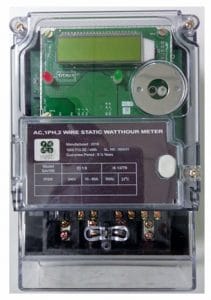Power meters are to get both smart and prepaid, under a Union power ministry plan to reduce distribution losses to 15 per cent by 2019.This needs some changes in billing format and to the Electricity Act. Some vendors have also raised questions over the specifications of tender conditions, as it doesn’t allow certain digital operations.

English daily, Business Standard reported, a committee had been formed to ensure “The cost of prepaid meter to be Rs 1,000 per piece and below”, to make it affordable for cash-short state power distribution companies (discoms). The plan is to issue a tender for procuring one million prepaid meters, to be anchored by Energy Efficiency Services Ltd (EESL).
The committee will have members from the power ministry, EESL, Central Electricity Authority (CEA), the industry and state energy departments. It has been asked to look for technical specifications based on standards of the International Electro-technical Commission (IEC). The latter designs standards for all electrical and electronic technologies.
Sector experts pointed to some challenges this move is likely to face. The Electricity Act, under sections 77 and 177, has vested power on CEA to draft standards for meter installation and operations. In a standard tender for prepaid meters, no other guideline or standard may be used. The current regulations do not have provision for prepaid meters.
The mode of electricity billing also needs to be changed with a mass rollout of prepaid meters. The industry, however, is looking forward to the tender, hoping this would boost their business. “The decision to go for prepaid meters for the larger population and smart ones for high-end users is strategically sound and would go a long way in achieving the objective of 24/7 electricity and revenue realisation. Indian industry is fully prepared, technologically and capacity-wise, to meet the demand and expectations of the government,” said Sunil Mishra, director general at the Indian Electrical and Electronic Manufacturers Association.
Prepaid meters in India have been tried at small scale in some cities and one state, Manipur, where it has been a success. The latter’s energy department, through a private company named Secure Meters, achieved full installation of prepaid meters across the state, boosting bill collection and revenue. In Bengaluru, some parts of Kolkata, Ghaziabad and Noida where private realtors installed prepaid meters, the model has been a success.
A prepaid system allows the user to purchase electricity as needed for a certain duration, like talktime for mobile phones. It can be recharged regularly, depending on consumption. A prepaid meter tracks real-time usage, alerts the consumer and supplier, and stores consumption data. The Centre is keen on these to cut energy theft and losses faced by discoms.
Courtesy – Business Standard



























